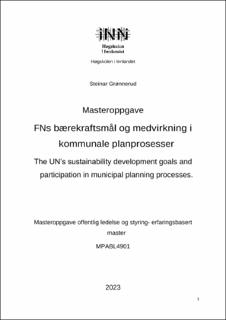| dc.description.abstract | Gjennom fastsettelsen av FNs bærekraftsmål har regjeringen bestemt at disse bærekraftsmålene skal være det viktigste grepet for å ta tak i vår tids største utfordring, å skape et bærekraftig velferdssamfunn. Gjennom blant annet «Nasjonale forventninger til regional og kommunal planlegging» er det vedtatt at disse bærekraftsmålene skal legges til grunn i all regional og kommunal planlegging. Mål med forventninger om at disse bærekraftsmålene skal følges opp i all fylkeskommunalt og kommunalt planarbeid. Med dette så har nasjonale myndigheter overført et stort ansvar for å følge opp en stor nasjonalt oppgave til alle kommunene i Norge, store som små uavhengig av kommune størrelsen, kommunens kompetanse eller den enkeltes kommunes økonomi. Hvordan disse målene skal nås av den enkelte kommune er ikke beskrevet utover at regjeringen ønsker at regional og lokal samfunns- og arealplanlegging skal være basert på åpen dialog mellom alle parter, der også staten deltar.
I denne masteroppgaven har jeg undersøkt hvilke forutsetninger små og mellomstore kommunene har for å kunne legge til rette for innføring av bærekraftsmålene i kommunal planlegging gjennom samarbeid og medvirkning. Jeg har også undersøkt om det er noen forskjell mellom små og mellomstore kommuner mot store kommuner i hvor langt kommunene har kommet med å få implementert bærekraftsmålene inn i planverket. Oppgaven bygger på en kombinasjon av dokumentanalyse av case- kommunenes planverk og intervju av fire forskjellige kommuner innenfor en og samme region.
Funnene i oppgaven tyder på at det er en sammenheng mellom kommunestørrelsen, den enkeltes kommunes kompetanse og den enkelte kommunes økonomi i hvor langt kommune har kommet med å få implementert FNs bærekraftsmål inn i planverket. Studiene viser også at tiltros for at kommunene er godt kjent med betydningen av medvirkning, er det store forskjeller hvordan dette blir praktisert i den enkelte kommune. Det kan tyde på at den enkelte kommuners samlede ressurstilgang har stor betydning for hvor godt medvirkningskultur har fått lov til å etablere seg i kommunene og hvor langt de enkelte kommunene har kommet i å få implementert FNs bærekraftsmål inn i planverket. | |
| dc.description.abstract | Through the determination of the UN's sustainability goals, the government has decided that these sustainability goals will be the most crucial step in tackling the biggest challenge of our time, creating a sustainable welfare society. Through, among other things, "National expectations for regional and municipal planning", it has been decided that these sustainability goals must be the basis of all regional and municipal planning. Goals with expectations that these sustainability goals will be followed up in all county and municipal planning work. With this, the national authorities have transferred a great deal of responsibility for following up on a major national task to all the municipalities in Norway, large and small, regardless of the size of the municipality, the competence of the municipality or the finances of the individual municipality. How these goals are to be achieved by the individual municipality is not described beyond the fact that the government wants regional and local social and spatial planning to be based on open dialogue between all parties, in which the state also participates.
In this master's thesis, I have examined what prerequisites small and medium-sized municipalities must facilitate the introduction of the sustainability goals in municipal planning through cooperation and participation. I have also investigated whether there is any difference between small and medium-sized municipalities versus large municipalities in how far the municipalities have come in implementing the sustainability goals into the planning system. The master's thesis is based on a combination of document analysis of the case municipalities' planning work and interviews with four different municipalities within the same region.
The findings in the thesis indicate that there is a connection between the size of the municipality, the individual municipality's expertise, and the individual municipality's finances in how far the municipality has come in getting the UN's sustainability goals implemented into the planning system. The studies also show that although it is believed that the municipalities are aware of the importance of participation, there is a big difference in how this is practiced in the individual municipality. This may indicate that the individual municipalities' overall access to resources is of great importance for how well a culture of participation has been allowed to establish itself in the municipalities and how far the individual municipalities have come in getting the UN's sustainability goals implemented into the planning system. | |
